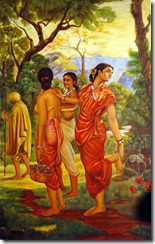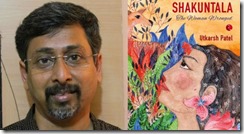Tags
book review, dushyant, independent, legitimacy, Mahabharata, mythology, shakuntala, strong women, utkarsh patel, vyas and kalidasa
A confession – I’d totally forgotten that Ved Vyas is the original writer (inspite of being an ardent adorer of his work). It’s Kalidasa’s romanticized version that was ingrained into my mind since childhood.
Yes, Shakuntala used to be my most-wanted bedtime story. Of course, it’s not the Vyas version that Mom narrated to me – and finally I know why. Vyas was a hardcore realist. No illusions, no lovey-dovey hackneyed sentiments. No blurred vision. Just cold, brutal realism. A huge hug of gratitude to Utkarsh Patel for re-introducing us to Ved Vyas’s Shakuntala. A woman, in so many ways, a worthy predecessor for Vyas’s Draupadi.
Kalidas’s Dushyant had the convenient excuse of Durvasa’s curse to forget Shakuntala after the secretive Gandharva marriage. Vyas’s Dushyant seduces, uses and discards Shakuntala.
Twitter review – A tale from abandonment to abandonment, culminating in liberation. An emphatic and empathetic female pov.
Shakuntala is the love child of Kshatriya-turned–sage Vishwamitra and the heavenly nymph Menaka. Rejected by an furious father & forced into abandonment by a reluctant Menaka, Shakuntala is adopted by sage Kanva. Shakuntala nurtures an independent mind, curious queries and clarity of thoughts as she questions men, power,dharma, laws and politics around her.
She gets an opportunity to practice what she preaches, when King Dushyant weds, beds and then dumps her. Shakuntala cuts through the riff-raff to reveal his ugly self to Dushyant. She ensures her son Bharat’s royal heirloom before she walks off into a lonely horizon with her pride, values & dignity intact.
Pros:
- An opportunity to revel in Ved Vyas’s original genius and his consistent homage to fiercely independent women.
- Kudos to Utkarsh for writing so tenderly & heartfelt from a woman’s pov, whether it’s about Ahalya, Menaka, Shakuntala or Madhavi.
His reply: I think all of us have a woman in us and all women have a man within them. Its the theory of anima and animus which works. In my case, the understanding of the women’s psyche is probably more defined and I have never shied away from accepting this factor.
My Q: Did Dushyant have other marriages in the 6 years between his 1st and last meeting with Shakuntala? If so, what would be status of Bharat vis-a-vis other royal heirs and the heirarchy?
His reply: Majority of the versions are silent about Dushyant’s other wives. It could just be a guilt factor which did not allow him to remarry. I have brought his angle about his guilt, when the minister suggests that he get married but Dushyant demurs.
- Utkarsh also neatly juxtaposes Dushyant’s hunter views ‘ He did not like to hunt if there was no chase.’ It fits in perfectly with Dushyant’s views on feminine conquests.
Cons:
- First few pages have dialogues of 2 characters crowded into one paragraph. It’s wholly unexpected from a Rupa publication.
- I found it self-defeating when Shakuntala extracts a pre-nuptial promise of legitimacy for her son. She however extracts none for a daughter, thus making a daughter as vulnerable to subsequent slurs as herself. Given her feminist tirade, it seems out of character. But that probably, is a query targeted at Vyas rather than at Utkarsh.
- The title should have read ‘A woman to be proud of’ instead of ‘A woman wronged’. The latter gives Shakuntala a victim tag, which she vehemently refused to become.
Verdict: Timely & time tested, well researched (Utkarsh does hold a degree in Comparative Mythology from Mumbai university) and well presented woman’s perspective by a male author. Recommended for admirers of mythology, Ved Vyas and fiery women.
Genre: Mythology/ Fiction
Publication: Rupa
Author contact: www.utkarshspeak.blogspot.in
Price: Rs 295/-
Pages: 269





Thanks for this Review Sweety. I was not going near that book fearing that it is the Kali dasa’s creeper-hugging, weepy Shakuntala. Such a relief to get Krishna Dwaipayana’s original Shakuntala back. Will catch it sometime.
LikeLike
Yes was quite a revelation for me too. So it’s not just you & I, even Kalidasa couldn’t help tweaking Vyas’s characters with his creativity 🙂
LikeLike
Ohhh yes, for some strange reason, Kalidas wanted to whitewash Dushyant. Never understood why he wanted a demure Shakuntala for that.
LikeLike
Perhaps b’cos he was poetic and tender hearted, so he wanted a happy ending? Of course for a happy ending you need a goody goody pair, so both had to be much in love, beautiful people with whom fate played villain. I’ve read his Pururava-Urvashi too. Its full of love, longing, evil fate, strange miracles et al.
LikeLike
Excellent Review. However, I have a question. Did this Shakuntala episode really happen OR this is an imaginary novel written by a learned writer thousands of years ago? No doubt people in India in those times were highly educated and they could write “novels”. Same is true for Ramayana and Mahabarata. Novels written by well known authors of that era. They all sound like our Indian movies.
LikeLiked by 1 person
I’m sure Vyas was a prolific thinker with a vivid imagination and super intellect. However like all good writers, he could easily borrow from real happenings around him and weave them into a tale. So a Shakuntala-like woman could have verily happened, after which he captured her into a story.
Its actually Indian movies that have borrowed from our epics. I mean think of bichade-bhai, good cop-Don born of same mother, love triangles, bromance, rivalries, property disputes, saalon se chali aa rahi dushmani, forever friendships etc. Its all there in the original masala epics.
LikeLike
Hmm….. A good and precise review as always. The catch for me in it is the woman’s perspective by a male author. And thanks, Sweety, for the tweet version this time. 🙂
LikeLike
Twitter version was solely for you 🙂
I can never stop marveling when male authors capture the essence of woman’s mind. Be it Vyas or Tagore.
LikeLike
Looks like a book I can pick up.
LikeLike
Absolutely. Worth a try
LikeLike
it is a very difficult thing to attempt a subject known to all….your review is not just a review but a perspective and a thorough study of the story 🙂
LikeLike
Indeed, a well known story comes with baggage. It needs a super dewy fresh perspective to generate interest. Thank you for your flattering words 🙂
LikeLike
Lovely review
LikeLike
Thank you! Glad u enjoyed it
LikeLiked by 1 person